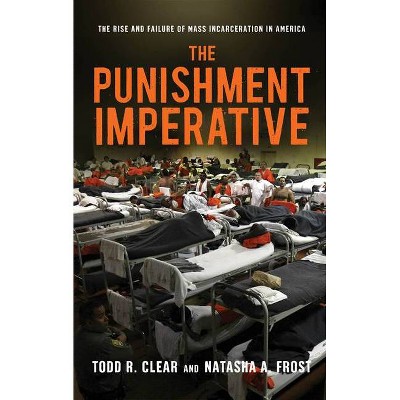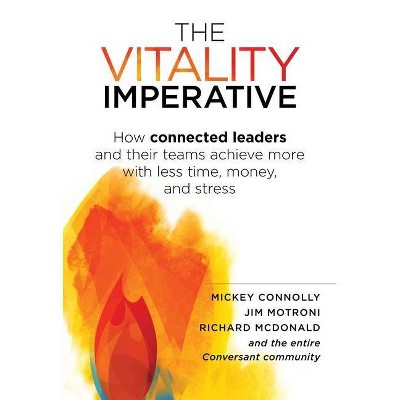The Punishment Imperative - by Todd R Clear & Natasha A Frost (Hardcover)

Similar Products
Products of same category from the store
AllProduct info
<p/><br></br><p><b> Book Synopsis </b></p></br></br>Over the last 40 years, the US penal system has grown at an unprecedented rate--five times larger than in the past and grossly out of scale with the rest of the world. In The Punishment Imperative, eminent criminologists Todd R. Clear and Natasha A. Frost argue that America's move to mass incarceration from the 1960s to the early 2000s was more than just a response to crime or a collection of policies adopted in isolation; it was a grand social experiment. Tracing a wide array of trends related to the criminal justice system, this book charts the rise of penal severity in America and speculates that a variety of forces--fiscal, political, and evidentiary--have finally come together to bring this great social experiment to an end. The authors stress that while the doubling of the crime rate in the late 1960s represented one of the most pressing social problems at the time, it was instead the way crime posed a political problem--and thereby offered a political opportunity--that became the basis for the great rise in punishment. Clear and Frost contend that the public's growing realization that the severe policies themselves, not growing crime rates, were the main cause of increased incarceration eventually led to a surge of interest in taking a more rehabilitative, pragmatic, and cooperative approach to dealing with criminal offenders that still continues to this day. Part historical study, part forward-looking policy analysis, <em>The Punishment Imperative</em> is a compelling study of a generation of crime and punishment in America.<p/><br></br><p><b> Review Quotes </b></p></br></br><br>Backed up by the best science, Todd Clear and Natasha Frost make a compelling case for why the nations forty-year embrace of the punitive spirit has been morally bankrupt and endangered public safety. But this is far more than an exposé of correctional failure. Recognizing that a policy turning point is at hand, Clear and Frost provide a practical blueprint for choosing a different correctional futurecounsel that is wise and should be widely followed.--Francis Cullen, Distinguished Research Professor of Criminal Justice, University of Cincinnati<br><br>Clear and Frost have helped start the most important conversation facing criminologists at the moment. How do we substantively reduce prison populations?-- "Crime Law Social Change"<br><br>Criminologists Clear (Imprisoning Communities) and Frost (The Punitive State) offer an accessible study of mass incarceration in the U.S. that is theoretically sophisticated and rich in statistical data . . . . A meticulously organized concluding chapter lays out their proposals with an eye toward reducing sentences and making them more humane for nonviolent offenders. The book merits serious consideration beyond an academic audience.-- "Publishers Weekly"<br><br>For forty years, the heavy hammer of criminal punishment has been the nation's primary tool for addressing social problems. And when the hammer has failed to fix these problems or does further damage, we've responded by grabbing an even bigger hammer. In The Punishment Imperative, Todd Clear and Natasha Frost convincingly demonstrate that the hammer has, finally, become too heavy for us to raise. They offer a masterful dissection of this 'grand social experiment'; showing how we embarked on this strategy, its costs to individuals and communities, and a clear-headed path to real reform. The Punishment Imperative is neither armchair critique nor utopian vision, but rather an eye-opening and truly authoritative treatment by two true experts on punishment's past, present, and future.--Christopher Uggen, co-author of Locked Out: Felon Disenfranchisement and American Democracy<br><br>It is too soon to tell if a sea of change is upon the US penal system, but the authors make their cogent argument in this well-written book. Summing Up: Highly recommended.--P. Horne "Choice"<br><br>Part historical study, part forward-looking policy analysis, The Punishment Imperativeis a compelling study of a generation of crime and punishment in America.--Douglas A. Berman "Sentencing Law and Policy"<br><br>The book's 200 pages of details and its prescriptions will be intriguing even to those who know the field.-- "Jotwell"<br><br>This compelling narrative helps us better understand the history, trajectory, and complexity of the politics of punishment in the United States over the past four decades. At a time of impending shifts in the correctional landscape in this country, this impressive volume should be on the reading list not only for scholars and students of mass incarceration, but also for corrections practitioners and policymakers everywhere who care about a new vision for America's penal system.--Laurie O. Robinson, Former Assistant Attorney General of the United States Department of Justice<br><br>This short, efficiently conveyed study cannot delve into all of the ramifications of how to integrate those returning to society, however, The Punishment Imperativeattests to the need for a better way to manage the millions that our nation have, for too long, relegated to simply lock up, forever.-- "Popmatters"<br><br>This well-documented volume will interest anyone connected to our criminal justice system and may appeal to general readers concerned about the subject of incarceration.--Frances O. Sandiford "Library Journal"<br>
Price History
Price Archive shows prices from various stores, lets you see history and find the cheapest. There is no actual sale on the website. For all support, inquiry and suggestion messagescommunication@pricearchive.us




















